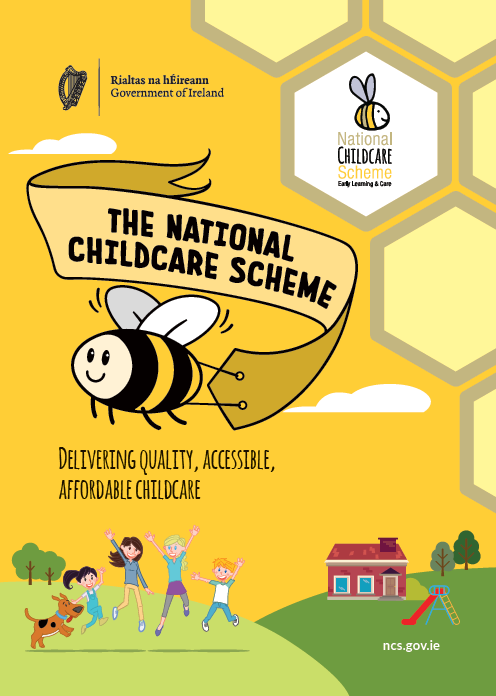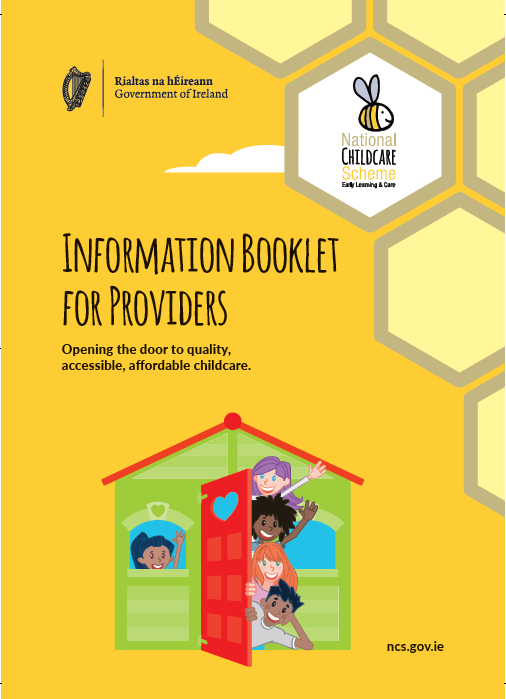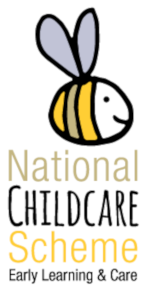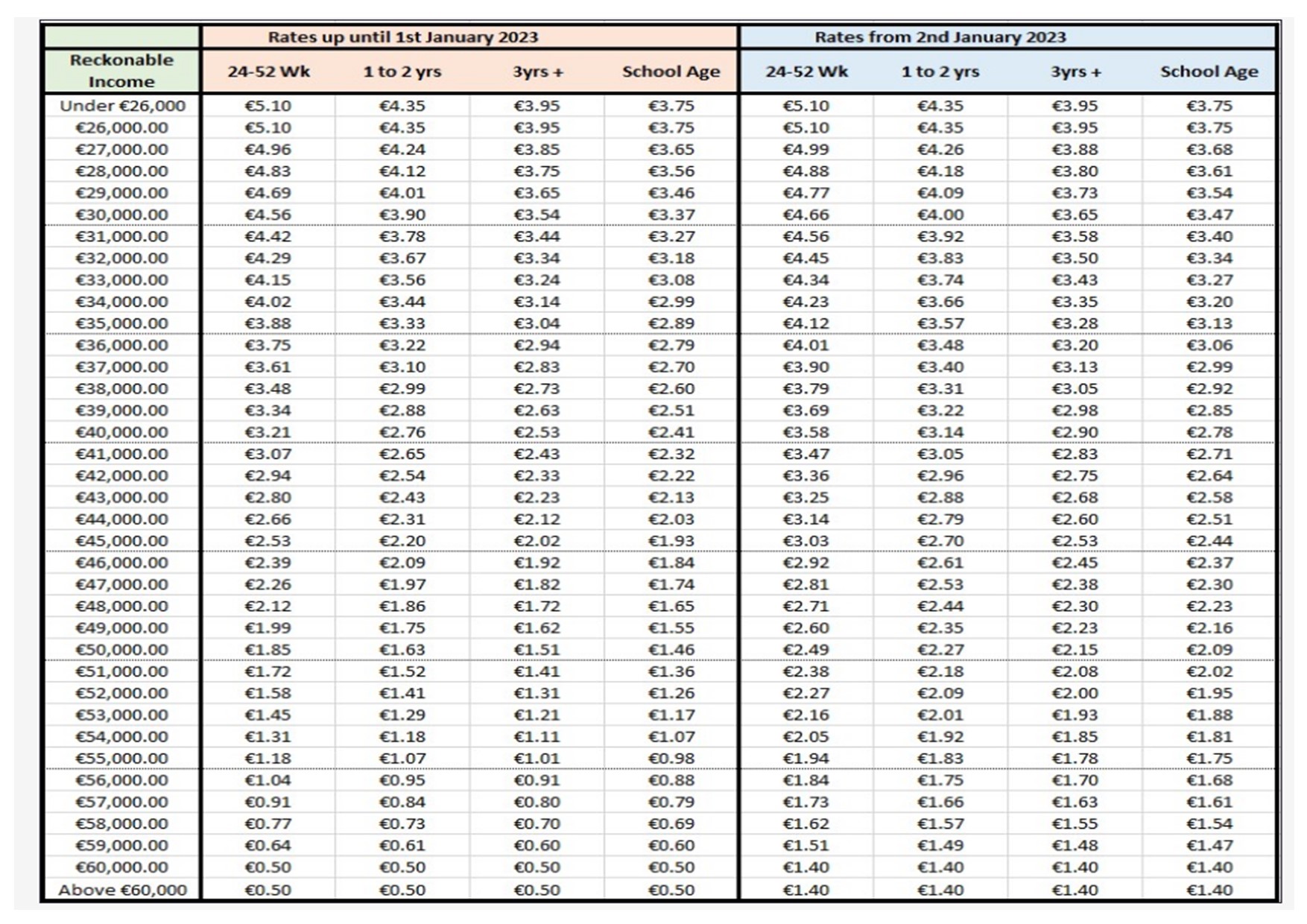AIM for Parents
This section of the AIM website contains information for parents and guardians of children who require AIM support for a child who is eligible for and participating in the ECCE Programme in an ECCE pre-school room.
Early Childhood Care and Education (ECCE)
The benefits for children of quality early childhood care and education are well documented.
Under the Early Childhood Care and Education (ECCE) Programme, all eligible children in the Republic of Ireland are entitled to free early childhood care and education (otherwise known as ‘free pre-school’) in the period before they start primary school.
With effect from September 2018, there will only be one intake of children in September each year – increasing all children’s participation on the ECCE programme to two full pre-school years, (please see the ECCE eligibility calendar).
In order to support children with a disability to access free pre-school, a major new programme of supports, the Access and Inclusion Mode (AIM), has been introduced.
| Access and Inclusion Model (AIM)
The Access and Inclusion Model (AIM) is a programme of supports designed to ensure that children with disabilities can access the Early Childhood Care and Education Programme in mainstream pre-school settings and can participate fully in the pre-school curriculum alongside their peers. AIM is a child centred model of supports, involving seven levels of progressive support, moving from the universal to the targeted, based on the needs of the child and the pre-school setting. The model is designed to be responsive to the needs of each individual child in the context of their pre-school setting. It will offer tailored, practical supports based on need and will not require a formal diagnosis of disability. Levels 1 – 3 of the model involve a suite of universal supports which are designed to promote and support an inclusive culture within pre-school settings by means of a variety of educational and capacity-building initiatives for pre-school providers and practitioners. International evidence suggests that these supports, when appropriately developed, are sufficient to support many children with disabilities. However, where a pre-school provider, in partnership with a parent, considers that some further additional support may be necessary to meet the needs of a particular child, they can apply for one or more targeted supports under levels 4 – 7 of the model. Additional targeted supports could take the form of expert early childhood care and education advice and mentoring (level 4), specialised equipment, appliances and minor alterations (level 5), therapeutic supports (level 6) and additional capitation to fund extra assistance in the ECCE pre-school room (level 7). More information on these targeted supports is provided below. Finally, AIM applies to all mainstream pre-school settings which are funded through the ECCE Programme. In addition to mainstream settings, pre-school services are also offered in special pre-schools and early intervention classes which cater exclusively for children with disabilities. While the underlying vision of AIM is to cater for as many children as possible in mainstream settings, it is recognised that a small number of children will continue to need specialised services. |
| Targeted Supports under AIM
A range of targeted supports are available under levels 4 – 7 of the Access and Inclusion Model. Level 4: Expert Educational Advice and Support The degree of support offered by Early Years Specialists will depend on the needs of the child and the pre-school provider. In some cases, this may involve developing an Individual Access and Inclusion Plan for the child within their pre-school setting, in conjunction with the parent and the pre-school provider. It may also involve liaising with HSE health and social care professionals to obtain their input and expertise. Your pre-school provider will have contact details for the Early Years Specialist Service and will contact them. Level 5: Equipment, Appliances and Minor Alterations Information on the different categories of “designated professional” who can complete reports and on the lists of minor alterations and equipment which may be funded under the scheme can be found in the AIM policy document and in the Pobal application and guidance documents, at the following link (Key Documents and Resources). Level 6: Therapy Services To avail of level 6 support, pre-school providers, in partnership with parents, should complete the online Access and Inclusion Profile. The Early Years Specialist will review the profile and, where therapeutic input is likely to be required, they will initiate contact with the HSE. Please note that this support is limited to therapeutic interventions which are critical to a child’s participation in the ECCE Programme. Level 7: Additional Capitation Applications for level 7 additional capitation should be made by the pre-school provider, in partnership with the parent, by completing the Access and Inclusion Profile and, within that profile, the level 7 service request. Following this, an Early Years Specialist will be in contact with the pre-school provider to progress the application. Two different rates of level 7 capitation are payable:.
|
| Getting Started and Accessing Supports
You will be able to access AIM supports through your pre-school provider. If you have not as yet identified a suitable pre-school for your child, information on childcare services may be viewed on Pobal Maps via this link. You can search by facility name or address, or browse to your location to click on the service and access further information. For a video tutorial on how to use this resource please click HERE. If you require any further assistance with using the system, please email This email address is being protected from spambots. You need JavaScript enabled to view it.. Alternatively your local City or County Childcare Committee will be able to assist you – a list of all CCCs can be found here (CCCs). When you have identified a pre-school for your child, your pre-school provider will, in consultation with you, consider what supports may be needed to ensure your child’s meaningful participation in the ECCE Programme. Where it is considered that your child needs additional support, your pre-school provider can apply, in partnership with you, for targeted supports under AIM. Applications are made via the Programmes Implementation Platform (PIP) on the Pobal website. Pobal are the current administrators of the ECCE programme. Your pre-school provider will be familiar with the Pobal website and with PIP. Applications can only be made with your full consent. A copy of the parental consent form can be viewed here [Parental Consent Form]. This form should be printed and signed by the parent and should then be uploaded and submitted with the completed application. In providing consent for an application to be made, you are also providing consent for information on your application to be shared with relevant professionals involved in processing the application and providing supports under AIM (eg. Early Years Specialist, HSE occupational therapist, Pobal officials etc.). Where an application for supports has been made, Pobal will process the application and will inform both the parent and the pre-school provider of the decision reached. Where a parent, in partnership with a pre-school provider, is unhappy with the decision reached by Pobal, they can seek a review. More detail in relation to the process of decision making is available here under AIM rules 2022/2023. |
| AIM Policy The AIM policy places the child at the centre and recognises the important role of the parent in all decision-making concerning access and participation. The full policy underpinning AIM can be accessed here. Further information can also be found in the Frequently Asked Questions and Key Documents and Resources sections of this website. |
National Childcare Scheme
The National Childcare Scheme (NCS)
What is the National Childcare Scheme?
The National Childcare Scheme provides subsidies to help parents meet the cost of quality Early Learning and Care and School Age Childcare. It will replace all previous targeted childcare support programmes with a single, streamlined and user friendly Scheme.
Under the National Childcare Scheme, subsidies are available for families with children aged between 24 weeks and 15 years who are attending any participating Tusla registered childcare service, including any Tusla registered childminder and school age childcare services.
There are two types of subsidies under the National Childcare Scheme:
- Universal subsidies are available to all families with children between 24 weeks and 15 years of age. It is not means tested and provides €1.40 per hour for up to 45 hours per week off the cost of a Tusla registered childcare place
- Income Assessed subsidies are available to families with children aged between 24 weeks and 15 years. They are means tested and will be calculated based on your individual circumstances. The subsidy rate will vary depending on your level of reckonable family income, your child’s age and their educational stage. It can be used towards the cost of a Tusla registered childcare place for up to a maximum of 45 hours per week. To apply for an Income Assessed subsidy, your reckonable family income has to be less than €60,000 per year. Read more about this in Question 21 of the FAQ's Under the heading How is my income assessed
For more information on Universal and Income Assessed subsidies click here.
Click to view National Childcare Scheme Information Leaflet and Frequently Asked Questions click.
How to Apply
To apply for the Scheme online you will need to have a verified MyGovID.
Your verified MyGovID is your single, secure account to unlock Irish Government services online. Click here to set up your verified MyGovID before you apply.
For further information relating to the National Childcare Scheme please visit https://ncs.gov.ie/home
| Information Booklet for Parents | Information Booklet for Providers | Subsidy Calculator | Subsidy Rates for 2022/2023 |
 |
 |
 |
Click on the image below to enlarge |
Introduction to Childcare Funding Programmes for Parents
The Importance of the Early Years
There is a very significant body of evidence that the early years matter. Some key points are:
- The portions of the brain that control vision, hearing and language development all start developing at birth and peak before the child reaches 18 months
- Language and literacy skills begin to develop before a child uses its first words; by the age of three, 50% of our language is in place with 85% by the age of five
- Early experiences shape how the brain develops
- Interactions between a child and parent directly affect the architecture of the brain
- Prolonged stress in the absence of protective relationships is damaging to the developing brain and can result in problems in learning and development.
In brief, development in the early years is a key determinant of the child's future learning capacity, the ability to choose right from wrong, the ability to interact with others, the ability to develop trust and respect for other people. The evidence provides unequivocal support for the economic benefit of investment in early childhood and shows that the benefit accrues not only to the individual child and family, but to all citizens. Early childhood services provide essential support for children's cognitive, social and emotional development: they also enable parents to participate in the workforce and they provide valuable employment for skilled workers. In addition to these universal benefits, evidence demonstrates that more intensive and targeted early childhood services have the potential to significantly enhance the life chances of more vulnerable children.
In recognition of the above, State investment in early childhood care and education has been a key focus of recent years, and despite economic difficulties, every effort has been made to maintain a high level of investment.
State Investment
Prior to 2000, there was very limited capacity in the childcare sector. However, over the decade 2000 to 2010, the State, initially in partnership with the EU, invested €425 million capital funding to create childcare places throughout Ireland. About 65,000 extra places were created. Due to this investment Ireland has a good infrastructure for childcare which can provide the basis for quality services that meet the needs of children and families.
On behalf of the Childcare Directorate of the Department of Children Equality Diversity Inclusion and Youth (DCEDIY) the County Childcare Committees (CCC’s) administer the main childcare funding programmes that subsidise fees for parents in early year’s services locally. There are two key government funded childcare programmes as follows:-
Information on Parent & Toddler Groups
What is a Parent & Toddler Group?
A Parent & Toddler group is usually a group of adults and children, who get together to provide activities for children under the age of 5. They are usually run by parents so that parents, grandparents, guardians, childminders and carers can attend, together with their children for a small charge, which helps pay for the toys, insurance, craft activities and refreshments.
How old can my child be, before they can attend?
You can attend a Parent & Toddler Group with a new-born baby, a baby who has just learnt to sit, a toddler and a pre-schooler, or a combination of the above. The earlier you attend, the more likely you are to establish long-term friendships with other parents, you are able to share the expertise of other parents - if you feel you are on your own, struggling with your baby's demands or feel isolated, or just want to make friends who are interested and enthusiastic about your baby too - then Parent & Toddler Group is perhaps the place to find them.
What does it offer my child?
This really depends on what the group actually offers within the sessions, but it is sure to cover a range of the activities for pre-school age children, and provide some of the firm foundations that under three's need.
Local groups can offer:
- Group activities when the children all sit together - great social skills!
- Opportunity for children to run around, use large motor skills and try out a variety of ride on toys.
- Crafts - painting, college, chalk, colouring, sticking and more, sometimes related to themes, so you may actually get a card on Mothers Day!
- Opportunity for messy play - playdough, sand, exploring soil or water.
- Opportunity to recreate roles, dressing up or playing in the home corner.
- Stories and singing as a group, or even music and movement sessions.
- New experiences with special visitors - firemen, librarian, postman, gardai etc.
- Table top activities - puzzles, simple games, books to share.
- A carpeted area for the babies with activity frames, cushions and baby toys.
- Friendship and support to carers, and parents.
Benefits to Children
- Children get to interact with other children, while their parents / carers are close by: this helps to build the child’s confidence and social skills.
- Parent & Toddler Groups are a great stepping stone in preparing children for playgroup / pre-school.
- They provide children with opportunities which may not be available at home such as messy play, creative play, songs and stories
Benefits to Parents
- Great way to meet other parents in the locality, to share experiences and glean support from others in similar circumstances.
- Social contact with other adults as Parent & Toddler Groups may be the only social contact for some parents / carers so these meetings help reduce and prevent isolation.
- Parent & Toddler Groups can be a great social network and can be especially helpful to parents who do not have family support close by.
Guidelines for setting up a Parent & Toddler Group
- Get support from wherever possible e.g. Offaly County Childcare Committee Ltd, HSE, IPPA etc.
- Form a committee and elect officers i.e. Chairperson, Treasurers, Secretary, Health & Safety Person and perhaps PRO.
- Decide on a suitable premises or location for the Parent & Toddler Group meeting and ask the local Fire Officer to check the building to advice on fire drills and fire safety issues.
- Organise insurance (IPPA operates a group insurance scheme for Parent & Toddler Groups).
- Open a Bank Account in the name of the group with three signatories (usually the two Treasurers and the Chairperson).
- Decide on and set down the operating rules of the Group which may act as the Group constitution.
- Decide on a draft action plan for three months (This can be expanded to an Annual Plan when the group is well established).
- Apply for funding
How are Parent & Toddler Groups run?
- Most Groups are run by a committee comprising of a Chairperson, Secretary, 2 Treasurers and PRO.
- All other members of the Group also form part of the Committee.
- Most groups will have a planning meeting before starting the Group. At this meeting the group will decide on their aims and objectives, activities for the near future and a daily routine for the Group
- Many members of the group will have hidden talents - some will be great organisers, some will be ideas people, some will be arty, some will love reading aloud, some will be able to sing and play musical instruments. Harness the talent within the group to ensure a communal effort.
Toys & Equipment
General
- Suitable chairs and tables for adults
- Tea-making equipment
- Cups and beakers
- Nappy-changing facilities in a separate area from the children.
- A secure gate / barrier to prevent the children leaving the building or accessing areas which could present a danger e.g. kitchen, stairs etc
For Babies
- A safe area with soft flooring
- Soft toys
- Rattles
- Coloured bricks
- Ball pool
- Activity centres
For Crawlers
- If space permits cordon off a separate area with roll along toys, stacking toys, coloured bricks, cars, dolls, cloth books etc
For Toddlers
- Dolls, teddies, prams and push chairs
- Sit and ride toys
- Garage and cars
- Jigsaws
- Building blocks
- Dress up clothes
- A toy kitchen
- Coloured hard back books
- Play dough
- Paint
- Arts & Crafts materials
- If space permits, sand and water play provides good development opportunities for toddlers but needs to be supervised closely
Day to Day Running of Group
- Block book premises
- Organise key for unlocking & lock up at end of session
- Set up premises
- Welcome parents / carers and get them to sign in
- Register new parents and record them in the register and accounts book
- Organise drinks and snacks in a separate area
- Supervise play activities
- Welcome guest speakers
- Advertise service
- Keep records of all the Group Activities, especially the financial transactions
Tip: A job bag – each job goes into a hat and as the adults register they pull out their task for the day – great for the task shirkers in a group!!!!!
For further information and support on setting up a Parent and Toddler Group in your area contact Sheena on 057 9135878 or email This email address is being protected from spambots. You need JavaScript enabled to view it.
To find a Parent & Toddler Group CLICK HERE
Insurance for Parent & Toddler Groups
Early Childhood Ireland run a Group Insurance Scheme for Parent and Toddler groups. For details, please contact Early Childhood Ireland on 01 405 7100 or log onto www.earlychildhoodireland.ie

